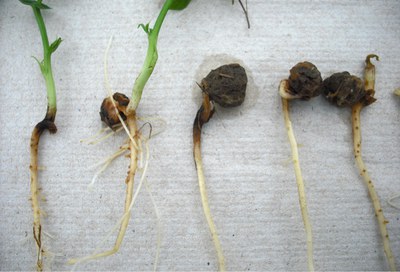
Pythium spp. is one of the pathogens in the root rot complex; however, the pathogen is considered less problematic than Aphanomyces and Fusarium as there are more prevention and treatment options. Along with Botrytis, it is the most common seedling disease, leading to seed rot and seedling blight. Pythium results in seed rot and damping off but can also be present in conjunction with other root rot diseases, and infected plants tend to lack vigour and often yield poorly.
Pythium spp. are similar to Aphanomyces in that they belong to a group of fungal-like root pathogens commonly referred to as “water moulds” or oomycetes. As the name indicates, they are particularly adapted to wet, saturated soils. Pythium can infect many host crops, including pulses, soybeans, cereals, and canola.

Unlike Aphanomyces, Pythium spp. can be seed-borne, including Pythium irregulare and Pythium ultimum. This means that the fungi can be present on or within the seeds and can infect the seedlings as they germinate and grow. When seeds are contaminated with Pythium, the pathogen can cause seed rot, damping-off, and other seedling diseases, leading to poor germination and weakened plants. Proper seed treatment and sanitation practices are important to reduce the risk of seed-borne Pythium infections.
Favourable Conditions for the Development of Pythium spp. Infections
- Wet Conditions: Wet feet stress plants and reduce rhizobia activity. Root rot fungi need water to germinate and infect roots.
- Even one day of waterlogging can substantially enhance root infection, damping off, and subsequent root rot development. (Canadian Agronomist)
- Cool Temperatures Early in the Season: Slow plant growth and slow nitrogen availability from organic matter.
- Research has found that the optimum temperature for infection of field pea was 15–22.5°C for P. ultimum and 17.5- 27.5°C for P. irregulare. (Ibid, Canadian Agronomist)
- Seed Quality: Infection depends on seed quality – cracked seeds are more likely to attract Pythium and be infected than intact seeds.
- Shortened Rotations: Increase the level of pathogens in soil.
- Heavy Textured Soils: More prone to waterlogging and compaction.
- Soil Compaction: Root growth impeded and less aeration.
- Soil: Acidic soil pH can reduce the formation of oospores and sporangia, so populations of Pythium spp. tend to be at a higher pH>7.0. (Ibid, Canadian Agronomist)
- Nutrient Deficiency: Slows seedling growth and weakens the plant.